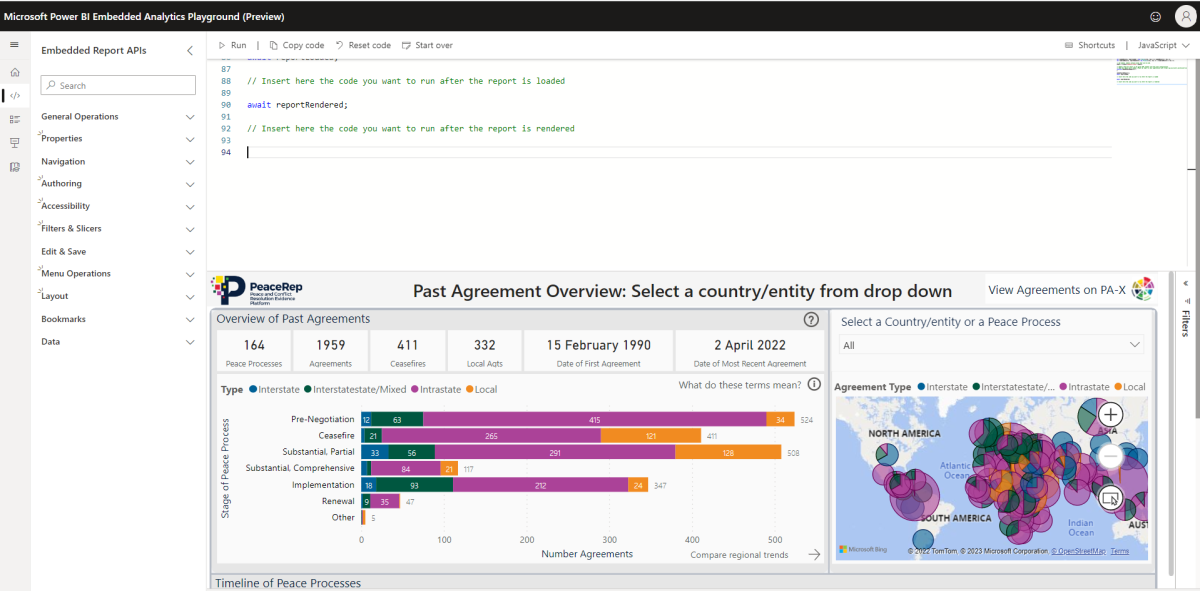Peace and Conflict Resolution Evidence Platform
8 March 2023
EPCC is providing computing and data engineering services for the Peace and Conflict Resolution Evidence Platform (PeaceRep), in support of the project to build an online platform for peace process data analytics. This cooperation is a prime example of the potential for EPCC and the Edinburgh International Data Facility (EIDF) to support data-driven social research. Read more in this article by Sanja Badanjak of the School of Law at the University of Edinburgh.
Based at the University of Edinburgh Law School, the PeaceRep team is researching how peace processes and transitions from armed conflict can be managed and supported, and how more inclusive post-conflict politics and greater opportunities for international development can be fostered. EPCC is helping the PeaceRep team to build a comprehensive system for combining data from a variety of sources, and in a variety of formats, to build interactive web applications that visualise and present peace process data.
Data collection
PeaceRep’s objective is to be the global leader in peace analytics and digital innovation in the field of peace studies. At the core of this endeavour is the data collection taking place for the PA-X Peace Agreement Database and Dataset, which is analysed and presented in parallel with data on other institutional developments (such as constitution-making, or elections), and data on a variety of socio-economic indicators provided by academic and official sources.
Transitions from conflict often include economic, political, institutional, and military transitions, all overlapping in time, space, and in terms of actors involved. The challenge for peace analytics is that these complex problems require calling upon data that vary in type (quantitative data, but also text and geo-location) and in size. The data relevant to PeaceRep also come from various levels – as the research relies on global, country-level data, peace process-level data, but also subnational data and data from surveys of citizens in particular countries. A further challenge stems from the processing and analysis component of this work, as the textual data in particular are summarised using natural language processing and machine learning methodologies.
Lasting data infrastructure
The cooperation with EPCC is aimed at building a lasting data infrastructure to store the wide and diverse data collected across the consortium, and in turn streamlining the usage of this data in a range of applications, including interactive peace process trackers that provide an integrated picture of post-conflict transitions in particular countries. The EPCC team is constructing a PeaceRep data warehouse in EIDF and establishing data ingest workflows for harvesting data from a wide variety of sources from January to March 2023, and the cooperation is expected to continue well beyond that period. They are also developing reproducible methods for enhancing dataflows in a Power BI service to consume – and publish reports based on – the data stored in the warehouse.
These online interactive peace process trackers that PeaceRep and EPCC aim to deliver in 2023 and 2024 are intended to serve multiple purposes: for academic users, they provide a tool for discovery and hypothesis-making; for policy users, they are providing context and history to a problem they may be coming to for the first time as well as an assessment of how transitions from conflict are developing. They are also a means of relying on innovative technology developed by the University of Edinburgh to support policy-making that is adaptive, evidence-based, and in support of global development.
Explore the PeaceRep interface with this Past Agreement Overview.

The PeaceRep consortium
PeaceRep is a seven-year research consortium led by the University of Edinburgh Law School. Its members include:
Conciliation Resources, Conflict and Civicness Research Group at London School of Economics; Coventry University’s Centre for Trust, Peace and Social Relations; Dialectiq; Edinburgh Centre for Constitutional Law; International IDEA; LSE Middle East Centre; Queens University Belfast; University of St Andrews; University of Stirling; and University of Glasgow.
We also work with a range of partners in the field, including Yemen Policy Centre, Yemen Polling Centre, Peace Track Initiative, and more.
PeaceRep is funded by UK Aid from the Foreign, Commonwealth and Development Office (FCDO), UK.
Find out more
Get in touch by emailing peacerep@ed.ac.uk or via Twitter at @Peace_Rep_.
Edinburgh International Data Facility (EIDF) website
Hosted and managed by EPCC, EIDF provides the core data infrastructure that underpins the Data-Driven Innovation initiative.
Author
Sanja Badanjak, School of Law, University of Edinburgh
